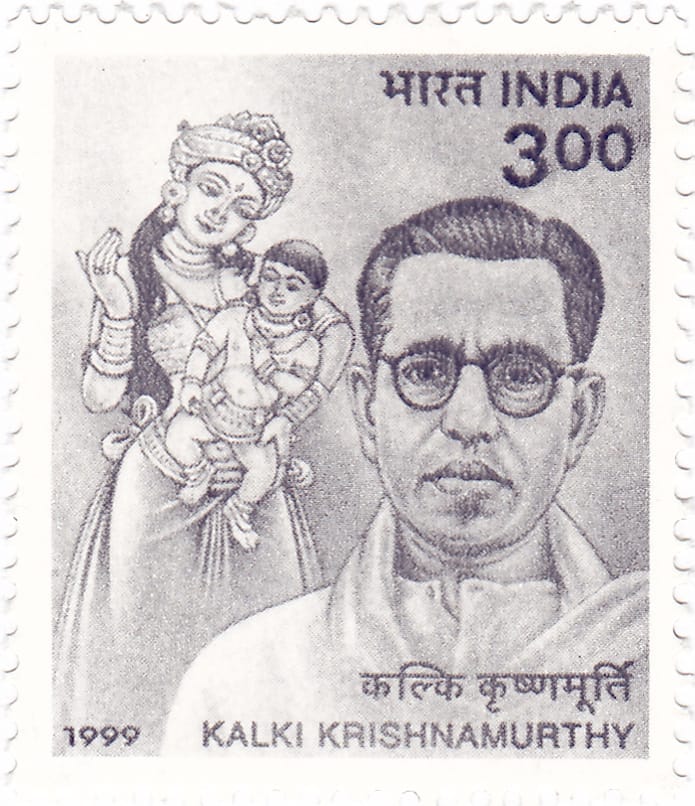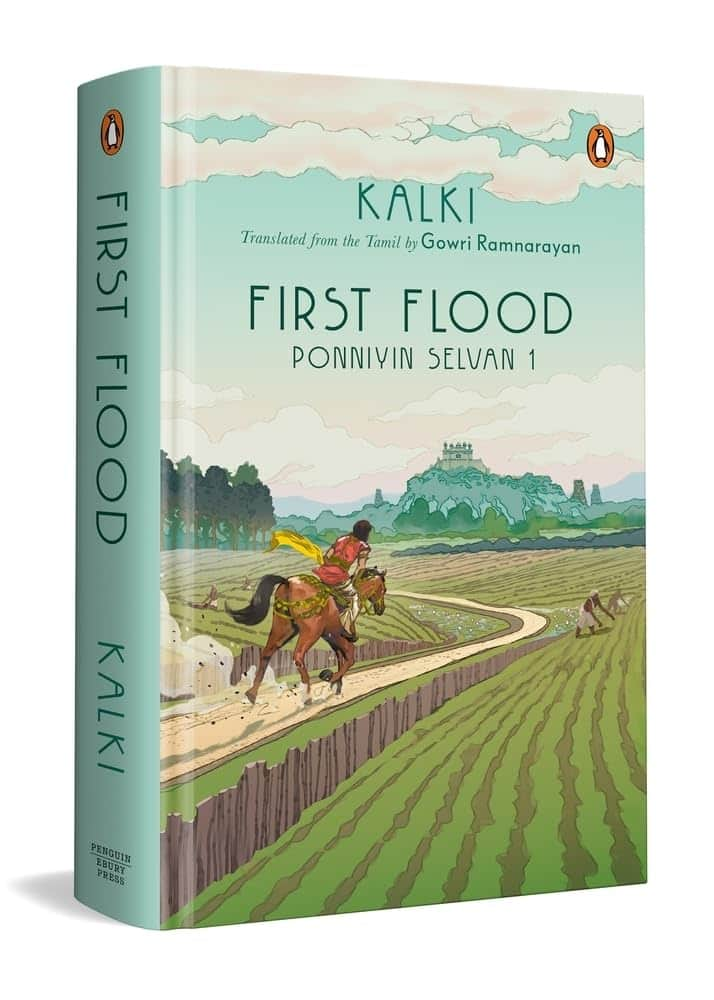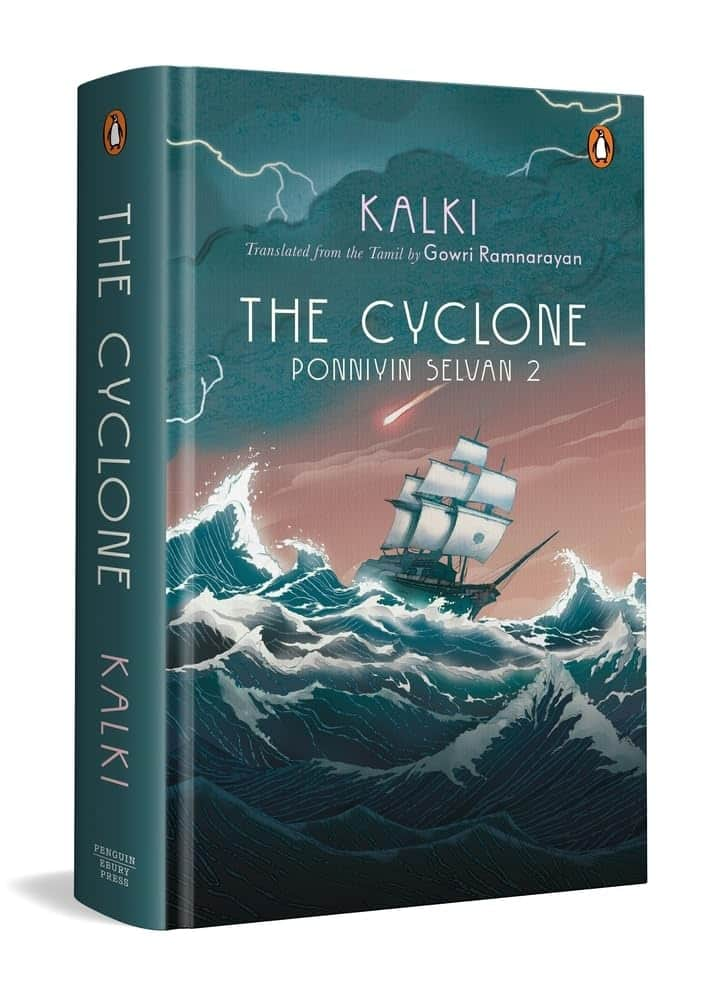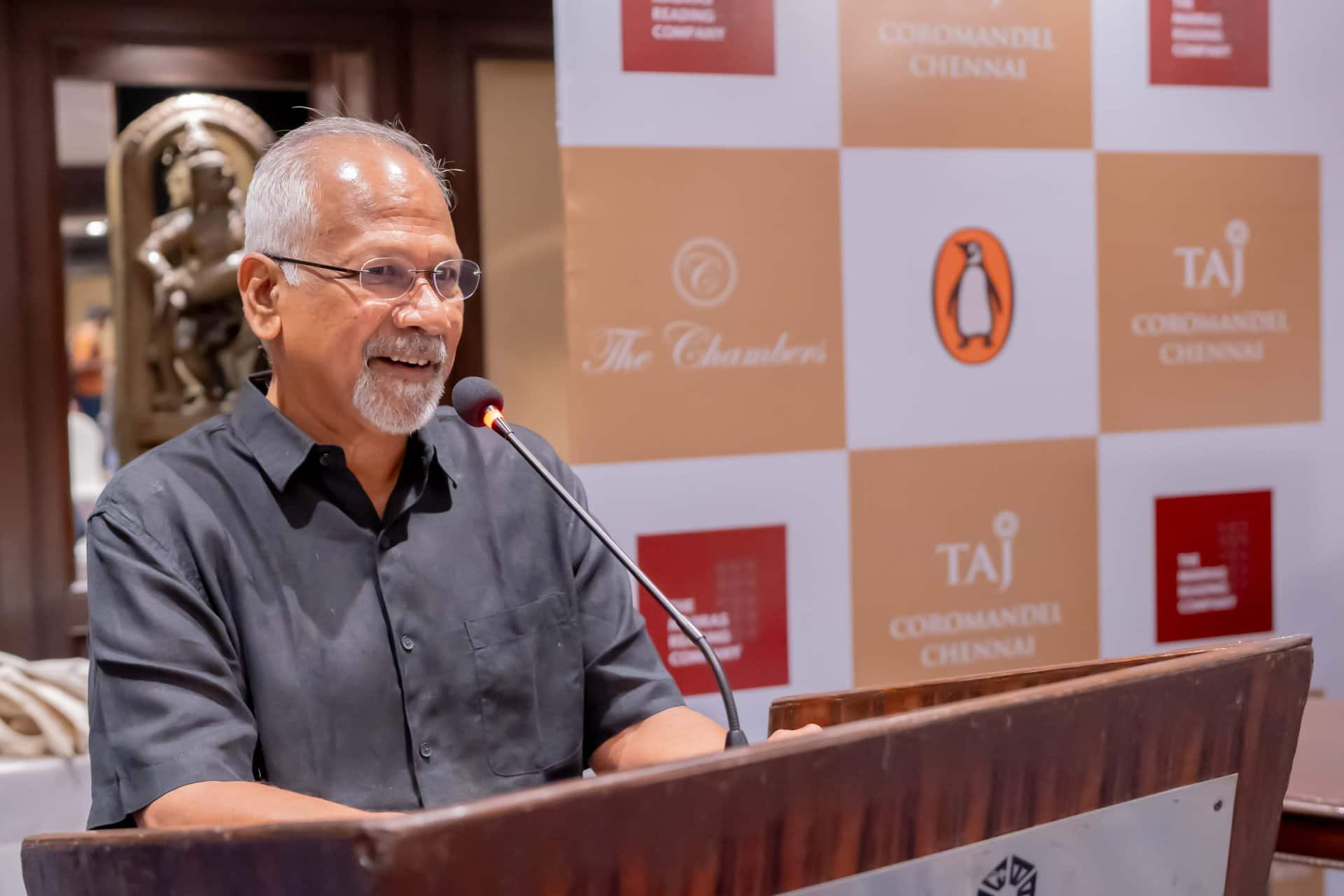



Before he became one of the best-known writers of his generation, Ramaswamy 'Kalki' Krishnamurthy became a school dropout. In 1921, he dropped out without having written his senior school leaving certificate exam, in response to Mahatma Gandhi's call for non-cooperation. Born in September 1899, Kalki would have been about 22 at the time.
This early but significant move was to define the rest of his career. Kalki became affiliated with the Congress party soon after dropping out and wrote pamphlets and political campaigns, among other things.
Even as Kalki began publishing his stories in magazine like Rajaji's 'Vimochanam', SS Vasan's 'Ananda Vikatan' and eventually 'Kalki' which he started in 1941 with T. Sadasivam (the seed money came from Sadasivam's wife, MS Subbulakshmi, who agreed to do a movie to bank role the Tamil literary magazine), the nationalist bent remained evident in his writing.
Indeed, the heroes of Kalki's stories could be swashbuckling adventurers, down-on-luck students or ill-fated kings out to defy destiny, but underneath the storytelling and the humour were packaged messages about a yearning for freedom, for equal opportunities in the world, and for building a nation Indians could be proud of.
Kalki and his stories have never gone out of vogue - especially in the Tamil-reading world. In 1999, India Post released a Rs 3 stamp to commemorate the centenary of Tamil writer and independence activist. Over the years, there have also been biographies and translations of his stories and historical novels.
 Kalki stamp (Image credit: India Post via Wikimedia Commons)
Kalki stamp (Image credit: India Post via Wikimedia Commons)
But nothing has revived interest in him and his work pan-India quite like Mani Ratnam's 'Ponniyin Selvan' movies. The films were Mani Ratnam's dream project, and he had famously thought about making them for 3.5 decades before Parts I and II starring Vikram, Aishwarya Rai Bachchan, Karthi, Trisha Krishnan and Jayam Ravi, among others, finally released on 30 September 2022 and 28 April 2023, respectively. Part 1 of Mani Ratnam's 'Ponniyin Selvan' won the Best Tamil Feature Film and Best Cinematography prizes at the 70th National Film Awards held on October 8 at Vigyan Bhavan in New Delhi.
On Friday (October 4), Mani Ratnam released the first two of six books in a new translation of Kalki Krishnamurthy's 'Ponniyin Selvan' books that were originally serialized in 'Kalki' between October 1950 and May 1954. The translator, Gowri Ramnarayan, is Kalki's granddaughter. She is also a journalist-turned-playwright. She has also previously translated some of Kalki's stories as well as MRM Sundaram or Sunda's biography of Kalki. She started translating the 'Ponniyin Selvan' books in early 2023; books 1 and 2 went on sale on September 30 and books 3 and 4 of six are slated to come out in November 2024.
In a phone interview from Chennai, Ramnarayan spoke about her earliest memories of Kalki, Kalki's politics and his writing, why she thinks 'Ponniyin Selvan' - which "Kalki started writing the year India became a Republic" marks a shift in his writing, and why she took up the translation of the book in 2024 even though the historical novel about the Chola dynasty has been translated in English before. Excerpts:
Kalki died very young. Did you ever meet him?
I was four years old when he died. I don't remember much. When everyone asks me to say (something about him), I wish I had lovely stories to tell them but I don't. I do have a faint memory of him sitting by my bedside and telling me a story, waving his arms about and telling the story in a very vivid manner. And I remember him singing some song - I honestly don't remember anything more.
Did other family members tell you about him, and about why he wrote?
Yes, his wife, my grandmother (Rukmani), talked about him all the time. She must have been 45 when he died, and she lived to about 90. She lived in his memory so strongly... very, very strong woman, by the way. And she talked about him all the time, to everyone. And she could do that because Tamil people were interested in Kalki's writing. They would come to meet her and ask her questions. She used to tell us some fantastic stories, and could unroll these anecdotes like a story with suspense and cliff hangers. And Kalki's life did have these cliff hangers... because he was a freedom fighter. "And then he stood in front of the magistrate, and he was going to be sentenced, and what did the magistrate say?" she would ask. And she tell me stories about how he would try to escape the CID who were following him, and how he would go to some eatery, and go out the back door and double back. These were very exciting stories for me to hear.
Kalki wrote Ponniyin Selvan between 1950 and 1954, just before he died.
He started writing it the year I was born.
 Penguin; 544 pages; Rs999
Penguin; 544 pages; Rs999
Did your birth have anything to do with it?
No, it just happened that way. He finished it in 1953 - in the middle of it - because it took about three-and-a-half years to be serialized. These novels were all serialized in a magazine; they were not written as novels. That is one of the reasons why you find some very interesting things; he had to finish every second chapter with something for the reader to expect.
The thing is, he was very sick. The last novel he wrote, 'Amarathara'. Amara is eternal, and tara is star; the story is about a film star. Before he could finish it, I think he wrote some 20 chapters, he passed away. And then my mother completed that novel. She was married when she was 16, she was 23 when he died, and she finished that novel. My mother also talked to me about Kalki; nothing like my grandmother stories, though, those were simply fantastic. So many other members of my family would tell me about him, from different points of view.
MS Subbulakshmi used to tell me stories, because I used to travel a lot with her. And her husband, Sadasivam, was his (Kalki's) best friend, so he would tell me stories. He lived for only 54 years, but everyone remembered him.
More importantly, I started reading very, very early and I have always been a voracious reader. I was studying in a Tamil-medium school; I learnt English much later, in high-school. I used to simply gobble up his writings, which were at home. And I liked his nonfiction more than his fiction in the beginning. I felt that I really knew him; he was my friend.
Do you remember any stories that M.S. Subbulakshmi or her husband might have shared with you about Kalki?
Her husband used to tell me how they met in prison the late 1930s and became friends. They came out and joined a magazine from which they were both fired because they were involved in seditious activities. Together, they started Kalki. Sadasivam encouraged him to start the magazine and call it Kalki. They didn't have funding; both of them were completely broke. They came from very poor families, not even lower middle class. And, running around in the nationalist cause, you can't make any money.
Subbulakshmi had an offer to act as a man - Rishi Narad - in a film. She was not at all happy to act as a man, but she swallowed her distaste, and she acted in the film in order to raise funds for these two guys to start their magazine called 'Kalki'.
 Penguin; 544 pages; Rs999
Penguin; 544 pages; Rs999
A lot of Kalki's writing, of course, happens before India's independence - it is how expresses himself and his ideology at the time. 'Ponniyin Selvan' comes almost immediately after, in newly independent India.
Yes, he started writing it the year India became a republic.
Did this timeline affect Kalki's reason for writing it or his message? And what does it mean for you to translate it in 2024?
See, Kalki essentially saw himself as a propagandist. His life had begun when he left school answering Mahatma Gandhi's Non-cooperation Movement (1921), and he joined the Congress Party as a powerful writer. He considered himself to be a pamphleteer all his life. And said openly that he wouldn't write a word if he didn't have a message.
The thing is that the message in his novels doesn't come directly. It comes indirectly through the lives of the people and the situations he portrays. He doesn't say you have to be good or noble. He wrote to promote his ideas. He was a fine writer, and he was able to do it in a convincing way.
One important reason (why he wrote), and this is even prior to 'Ponniyin Selvan', was he wanted to remind the Tamil people of their heritage. Because he found that in those times - in the 1920s and '30s, Indians had lost their self-confidence under the British and they didn't know much about their history, their background. He felt that the duty of a writer at a time like that was to make people aware of their heritage. That's why he started writing historical fiction; I am not even sure it was his favourite genre.
Kalki started writing historical fiction about the thirst for freedom, your pride in your achievements in your past, your poetry, your architecture. And by the time he came to Ponniyin Selvan, India had become a Republic. I think his concerns slightly shifted there, this is my conclusion: He was to write a novel to give his people - not just Tamil people, but all of India - I think he thought that he has to show the kind of world India should create as a free nation. There was no need now for the thirst, probably, with which he began his first historical novel, which was that the hero wanted his nation to be free.
This ('Ponniyin Selvan') is a meditation on leadership; what kind of leaders should India produce? So I think his Ponniyin Selvan, who is not the protagonist, he's not the hero of the novel, but Ponniyin Selvan is the ideal leader. And why is he the ideal leader? Because he is not interested in power; he is compassionate, he doesn't want civilians to be affected when there is war. And he shows the same attitude towards a fisherwoman as to royal Prince. And he is concerned for the people. The people love him. He loves the people so. And he is upright, righteous. He never, never lies.
These are sort of things he (Kalki) saw in Mahatma Gandhi, if you ask me. I am not saying he was writing about Mahatma Gandhi. Look at Sardar Patel - the strength of him; or (Jawaharlal) Nehru - the charm; or look at Netaji (Subhas Chandra Bose). He (Kalki) has written about all these people ad nauseum in his political essays, and he has campaigned for them. Rajaji, his mentor- he was inflexible when it came to intrepidity, courage. So these were the qualities I think he thought the leaders of India should have.
Now what should the people of India be like, what qualities should they have?
That was the second thing. You should be loyal, upright, support your leader, do the right thing, be proud of your country. So, all the qualities he wanted for the people, you find there. You will also find something that is dear to Kalki right from his very first short story: women are equal to the men in intelligence. You find both the men and the women, antagonist and protagonist, driving forward the narrative. You find women with physical stamina and strength as well as mental courage. He had this respect for women, and he wanted to show that this is not something that is found in modern times (alone), but this is our tradition, our past. And he found evidence of it in the Chola inscriptions. When he writes about Vanavan Mahadevi, the Dowager Queen, and then he talks about the Princess Kundavai (in 'Ponniyin Selvan'), there is evidence in inscription that they were very independent and high minded and charitable.
I was so interested in this that I researched this and found that Kundavai had not just made donations to the Buddhist monasteries but also to several Jain monasteries. And she herself belonged to a very highly Shiva-devoted dynasty. And she did start the hospitals. These are the things that I think must have made him write, because he wanted the new woman of India to be like this.
 Director Mani Ratnam at the book launch. (Image courtesy Penguin)
Director Mani Ratnam at the book launch. (Image courtesy Penguin)
So why did you decide to translate these books again in 2024; they've been translated into English before...
I know 'Ponniyin Selvan' like the back of my hand because I've read it several times, from the time I was 9 years old.
Penguin asked me to do the translations. In fact, I hesitated in the beginning because there were many translations of 'Ponniyin Selvan'
What do you think of those translations?
I haven't read any. Why should I? I mean, I know Tamil. I've read many translations, but of books in French, German, Italian and Spanish. I don't need a translation from Tamil; I haven't read a single translation from Tamil into English.
You have translated Kalki's works before, and he has a particular style of writing. Could you talk us through a bit of what it takes to translate his works into English?
I started with his biography, which is written by somebody else (Sunda). But the biographer has used a very novel technique. Because he's writing the biography of a prolific writer, he (Sunda) has practically told the story through Kalki himself. He starts with his own writings and quotes and profusely links them together in telling the story. I got to know a great deal about Kalki's developing style because the biographer has quoted right from the beginning, from 1925 days, when he (Kalki) translated Mahatma Gandhi's autobiography (as 'Sathya Sotanai').
Then I translated Kalki's 'Alai Osai', 'The Sound of Waves', set against the freedom struggle. I think it is my favourite novel of Kalki. It (the story) travels everywhere, starting from a small village in Tamil Nadu, it goes to Lahore, Karachi, Delhi, Bombay (Mumbai), Agra, Haripura... you name it and it's there... states and principalities under native kings. It's a political novel; it's about a socialist freedom fighter who believes in violence and Kalki had actually started writing this novel as a kind of paean of praise for the Mahatma. But as he was writing it, the Mahatma was shot dead. That completely changed Kalki's perspective. So though it was supposed to be a paean of praise for the Mahatma, it can be incredibly dark. I found that really fascinating, and translating that was comparatively easy because more or less it's set in our time: it starts in 1934 and ends in 1949. But it's still our time, right? So the language is not very difficult.
But 'Ponniyin Selvan' is a different ballgame altogether. What you find here is the language itself - and let me say here that Kalki's language is always fluid, simple, liquid; it just flows on and on - but it has echoes of so many ancient poems that he had read: Sangam poetry, all kinds of things. And he uses poems to create ambience, character, to tell you what's going to happen and what's not going to happen - so many different things he does with the poems. And he quotes from poems that go back 2,000 years. He starts with Sangam poetry, which is 2,000 years ago, and he ends with his own poems in his own time. That was the toughest thing in translating to this work. I mean, Oh my God! Translating those poems was extremely difficult. And I realized the importance of it in the novel. When you read it, you'll know that they are there for a very specific purpose each time. And the language itself, even though it apparently very simple and clear, it has so many depths. Which you don't notice when you are a reader, because it is a page-turner.
Did you have to fight the urge to put footnotes and endnotes everywhere?
No, I've put very few footnotes.
I just stumbled into translation by accident. (Vijay) Tendulkar's two plays I translated because Tendulkar asked me to and because of certain opportunities that turned up with this (with Penguin asking her to translate Kalki's work). So I don't know exactly how to do it. What my role. But I think of what I want in a translation. If I'm reading a translation of Homer's Iliad, I don't want hundreds of thousands of Greek words in it. I don't want to be looking at endnotes. So I have avoided Tamil world as much as possible, because that makes it very difficult for me to read when I read a translated work.
On this note of reading, how do you read 'Ponniyin Selvan' today? Of course, when it was written, like you said, there was this entire idea of making Indians proud of their heritage once again. What do you think it does in the 21st century?
I think it's a meditation on leadership, and we really need leaders of integrity and ability and strength. It shows you that from the moment you're born, you're a political animal. And here (in the books) you know what all the machinations are and how politics impinges on your life, and how important it is for us to be alert. People haven't changed, power mania hasn't changed. The more you read about it, the more shocked you are by the depths to which people can go around to conspire against somebody. So, that is very interesting. And, for me, what is really important in reading 'Ponniyin Selvan' today is the relevance it has for my times. The questions of ethics have become more complicated now in every arena - personal, social and political. This is a kind of examination, an exploration of ethics as it impinges on everybody's life - the ordinary citizen as well as the person on the top who controls the ordinary citizen.
Just now (as we are speaking) I thought of something else that I haven't thought of before. It's not just about the personal choices we make. When you're confronted with any situation, what kind of personal choices do you make - do you uphold your values, or do you make compromises? Those are very important questions. And they seem to matter more now because we don't have role models in the public field like Mahatma Gandhi and Nelson Mandela and Martin Luther King and so on. It's an old-fashioned word: sense of honour. I think you should have a sense of honour for yourself.
I don't deny that there is a fairly great danger of reading it only as a swashbuckling romantic adventure.
Are you worried about that?
No. My job is to do what I'm doing. What happens to it is not something I can control, right?
What did you think of the 'Ponniyin Selvan' movies?
This is something that so many people have asked me. I don't think I have a particularly better reason to express my opinion because I'm Kalki's granddaughter.
As a translator of the book, does that make you more qualified?
A movie is something completely different. It is Mani Ratnam's vision of what he saw in Ponniyin Selvan.
And as a movie reviewer? You had been critiquing films for many, many years as a journalist before this?
Honestly, I couldn't distance myself from the book so. And thank God I don't review films anymore. From the moment I started doing theatre, I thought you can't hunt with the hounds and run with the hare. So I stopped reviewing at that time. The positive thing is - and I'm not just saying it because Kalki is my grandfather - the whole India came to know about a writer whom they hardly knew outside Tamil Nadu because of these films. I think that's a great contribution in itself. This is something that focused people on literature, on a classic.
Discover the latest Business News, Sensex, and Nifty updates. Obtain Personal Finance insights, tax queries, and expert opinions on Moneycontrol or download the Moneycontrol App to stay updated!